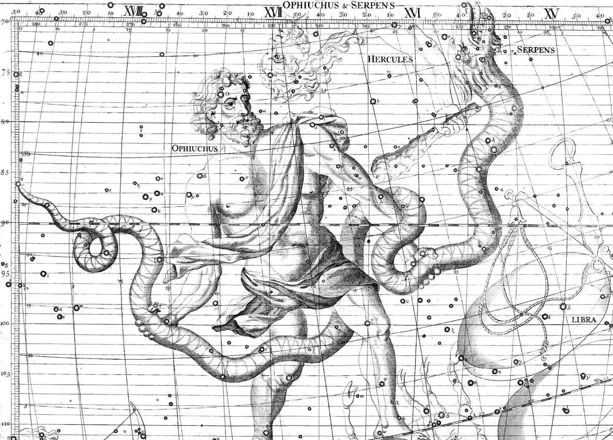What if we told you that there might be an overlooked constellation in the sky that holds ancient mythological roots? Unravel the mysteries of Ophiuchus, a constellation often excluded from the traditional zodiac, but brimming with fascinating stories. From Greek mythology to other ancient cultural connections, Ophiuchus has captured the imagination of countless civilizations throughout history. Join us as we delve into the mythological origins of Ophiuchus and explore the rich tapestry of legends surrounding this enigmatic constellation. Prepare to be amazed by the ancient tales that have woven themselves into the fabric of the celestial world.
Contents
- 1. The Constellation of Ophiuchus
- 2. Greek Mythology: The Healer
- 3. Other Ancient Cultural Connections
- 4. Ophiuchus in Contemporary Astrology
- Conclusion
-
Frequently Asked Questions
- 1. What does the name “Ophiuchus” mean?
- 2. Why is Ophiuchus not included in the traditional zodiac?
- 3. Which stars are the brightest in the constellation of Ophiuchus?
- 4. How can I locate Ophiuchus in the night sky?
- 5. What is the mythology behind the representation of Ophiuchus?
- 6. Are there any famous personalities associated with Ophiuchus?
- 7. How does Ophiuchus impact astrology?
- 8. Does Ophiuchus have any links to ancient Egyptian culture?
- 9. Are there any significant astronomical features within the constellation of Ophiuchus?
- 10. How does Ophiuchus influence one’s personality traits?
- References
-
Frequently Asked Questions
- Q1: What is the constellation of Ophiuchus?
- Q2: How was the constellation of Ophiuchus discovered?
- Q3: What is the representation of Ophiuchus in the zodiac?
- Q4: Who is Asclepius, the god of medicine?
- Q5: What is the significance of the serpent and the staff in Ophiuchus mythology?
- Q6: What was the wrath of Zeus towards Asclepius?
- Q7: How did Asclepius transform into the constellation of Ophiuchus?
- Q8: What is the connection between Ophiuchus and Egyptian mythology?
- Q9: How does Ophiuchus fit into Babylonian astrology?
- Q10: What are the personality traits associated with Ophiuchus in contemporary astrology?
- References
- Read More
1. The Constellation of Ophiuchus
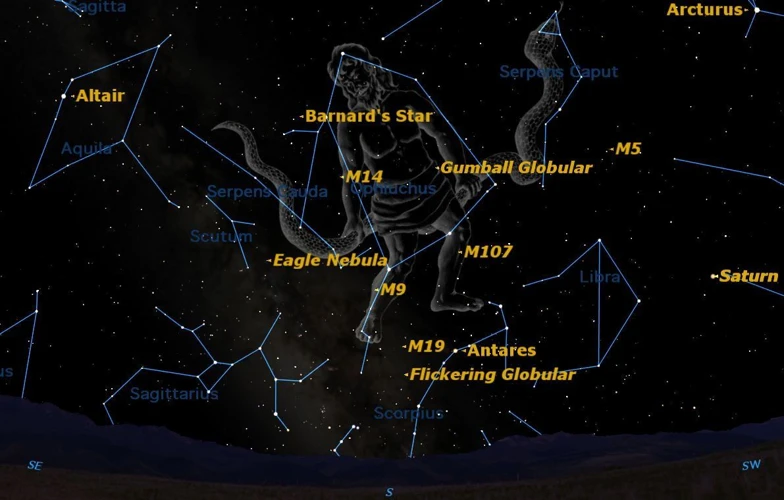
The Constellation of Ophiuchus is a stunning celestial formation that has captivated stargazers for centuries. Situated near the celestial equator, this constellation is nestled between Scorpius and Sagittarius. Ophiuchus, commonly known as the Serpent Bearer, is named after a figure from ancient mythology. The constellation is represented by a man holding a serpent, symbolizing the healing arts and wisdom. It is composed of numerous bright stars, including Rasalhague, a prominent binary star system consisting of a yellowish-white primary star and a bluish companion. Ophiuchus is also adorned with star clusters, such as the Barnard’s Star cluster, and several variable stars. With its mesmerizing celestial beauty, the Constellation of Ophiuchus continues to intrigue astronomers and stargazers alike.
1.1 The Discovery of Ophiuchus
The discovery of Ophiuchus dates back to ancient times, with its origins rooted in the observations of early astronomers. While the exact individual credited with its discovery remains unknown, Ophiuchus has been recognized as a constellation for thousands of years. It has been depicted in various ancient cultures, including Babylonian and Greek civilizations. The Babylonians considered Ophiuchus to represent their god of healing, Imhotep, while the Greeks associated it with Asclepius, the renowned healer. The recognition of Ophiuchus as a constellation showcases the deep fascination and reverence humans have had for the art of healing and the pursuit of wisdom. To this day, the constellation of Ophiuchus continues to be a symbol of the connection between mythology, astronomy, and the mysteries of the universe.
1.2 The Representation in the Zodiac
In the traditional Zodiac, Ophiuchus has often been excluded, only to be discovered by those with a keen interest in astrology. While the Zodiac is commonly composed of twelve signs, Ophiuchus adds another layer of complexity to the astrological world. Represented by the Serpent Bearer, this constellation brings unique traits and characteristics to those born under its influence. Ophiuchus is associated with qualities such as wisdom, healing, intuition, and a deep connection to the spiritual realm. Individuals born under this sign are believed to possess a magnetic personality, often described as enigmatic and mysterious. They are known to have a natural healer’s touch and the ability to bring harmony to those around them. If you are interested in exploring the enigmatic personality of Ophiuchus further, you can read more about it here. The representation of Ophiuchus in the Zodiac expands our understanding of astrological diversity and opens the door to a deeper exploration of the human psyche.
2. Greek Mythology: The Healer
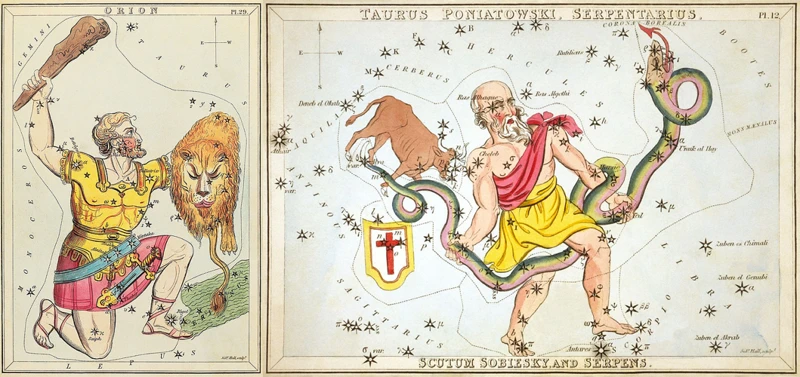
Greek mythology intertwines with Ophiuchus, as it tells a fascinating tale of a mortal who possessed extraordinary healing abilities. This mythical figure is named Asclepius, who eventually became known as the god of medicine. Asclepius was the son of Apollo, the god of healing, and his mother was the mortal princess Coronis. Raised by the wise centaur Chiron, Asclepius learned the art of healing and became renowned for his incredible skill in treating illness and injuries. He possessed the knowledge of medicinal herbs and had the ability to revive the dead, which brought both awe and concern amongst the gods. Legend has it that Asclepius was gifted a staff with a serpent entwined around it, known as the Rod of Asclepius, which has become a symbol of healing to this day. However, such power and the defiance of the natural order resulted in divine retribution. Zeus, fearing the balance of life and death would be disrupted, struck Asclepius down with a thunderbolt. In his honor, Zeus placed Asclepius among the stars as the constellation Ophiuchus, forever immortalizing the healer and his legacy in the night sky. The Greek mythology surrounding Ophiuchus adds a deep layer of significance to this constellation, cementing its status as a mythical symbol of healing and wisdom.
2.1 Asclepius, the God of Medicine
In Greek mythology, Asclepius takes the center stage as the God of Medicine. As the son of Apollo, Asclepius possessed great healing powers and was renowned for his ability to bring the dead back to life. He was often depicted with a staff entwined by a serpent, known as the Rod of Asclepius, which has become a symbol of medicine to this day. Legend has it that Asclepius acquired his healing skills from the centaur Chiron, a wise and knowledgeable creature who guided and mentored many heroes in Greek mythology. Asclepius’ proficiency in medicine became so renowned that even Hades, the God of the Underworld, grew concerned that his realm would become empty as people were saved from death. This led to a clash between Asclepius and Zeus, resulting in the godly punishment of thunderbolts that struck Asclepius down. Yet, immortality was granted to him, and he was honored by being placed among the constellations as Ophiuchus, forever reminding the world of his association with healing and medicine. The legacy of Asclepius continues to inspire and influence the medical field, with the Rod of Asclepius serving as a symbol of healing and wellness.
2.2 The Serpent and the Staff
The Serpent and the Staff are iconic symbols deeply intertwined with the mythology of Ophiuchus. In Greek mythology, Ophiuchus is closely associated with Asclepius, the god of medicine and healing. Asclepius is often depicted holding a staff with a serpent wrapped around it, known as the Rod of Asclepius. This symbol has become synonymous with medicine and is widely recognized even today. The serpent is believed to represent healing and rebirth, while the staff symbolizes authority and power. Legend has it that Asclepius possessed the knowledge to bring the dead back to life, an ability that earned him both reverence and jealousy. The intertwining of the serpent and the staff represents the delicate balance between life and death, sickness and healing. This mythical connection between Ophiuchus, the serpent, and the staff adds depth and intrigue to the constellation’s significance in astrology and its influence on individuals born under its sign.
2.3 The Wrath of Zeus
In Greek mythology, Ophiuchus faced the wrath of Zeus, the king of the gods. Ophiuchus, also known as Asclepius, was a skilled healer and a mortal. His ability to bring the dead back to life threatened the balance between life and death. Asclepius’s extraordinary healing powers attracted the attention of Zeus, who feared that mortals would become immortal and upset the natural order of the world. Fueled by jealousy and his desire to maintain authority, Zeus struck Ophiuchus with a thunderbolt, putting an end to his mortal life. However, recognizing Asclepius’s importance, Zeus immortalized him by transforming him into a constellation, forever commemorating the healer’s incredible abilities in the night sky. This celestial punishment became a testament to the consequences of challenging the gods and a reminder of Ophiuchus’s significant role in both mythology and astrology.
2.4 The Transformation into a Constellation
The fascinating story of the transformation of Ophiuchus into a constellation is rooted in Greek mythology. According to ancient legends, Ophiuchus represents Asclepius, the god of medicine and healing. Asclepius was the son of the god Apollo and a mortal woman named Coronis. His exceptional healing abilities surpassed all others, and he even possessed the power to resurrect the dead. This deeply troubled Zeus, the king of gods, as he believed that immortality should be the sole domain of the gods. Enraged by Asclepius’ success, Zeus struck him down with a thunderbolt, ending his mortal life. To honor Asclepius, Zeus immortalized him by placing his image in the night sky as the constellation Ophiuchus, forever reminding humanity of his healing prowess and the consequences of challenging the gods. Thus, Ophiuchus serves as a celestial testament to bravery, wisdom, and the pursuit of healing. To further explore the enchanting world of Ophiuchus, you can discover its astrological traits and uncover the personalities associated with this unique zodiac sign.
3. Other Ancient Cultural Connections
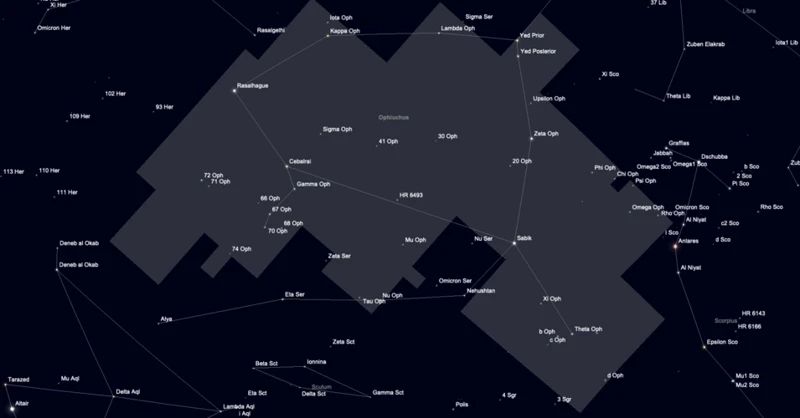
Other ancient cultural connections to the constellation of Ophiuchus further add to its mystical allure. The influence of Ophiuchus can be seen in various ancient civilizations, each interpreting and incorporating its symbolism into their respective mythologies. In Egyptian mythology, Ophiuchus is associated with the god Imhotep, who was revered as a physician and healer. Imhotep’s legacy as a skilled healer and his connection to Ophiuchus demonstrates the enduring association of this constellation with medicine and healing throughout different cultures. In Babylonian astrology, Ophiuchus is linked to the god Enki, known as the god of wisdom and magic, further emphasizing the constellation’s symbolic connection to knowledge and healing. Hebrew interpretations also recognize Ophiuchus, associating it with the tribe of Dan and representing the tribal emblem. These diverse cultural connections highlight the widespread recognition and significance of Ophiuchus in the ancient world, solidifying its place in the annals of mythological lore.
3.1 Egyptian Influence
The influence of Egyptian mythology on the constellation of Ophiuchus is intriguing and significant. In Egyptian cosmology, Ophiuchus aligns with the deity Imhotep, a renowned figure associated with medicine, healing, and wisdom. Imhotep was an ancient Egyptian polymath and high priest who served under Djoser, the pharaoh of the Third Dynasty of Egypt. He was not only revered for his medical prowess but also for his architectural achievements, such as designing the Step Pyramid at Saqqara. Imhotep’s connection to Ophiuchus highlights the Egyptian emphasis on healing and the divine knowledge associated with it. The prominence of Imhotep in Egyptian mythology showcases the important role that Ophiuchus played in the ancient Egyptian civilization, emphasizing the constellation’s association with healing and the pursuit of knowledge. This significant link between Ophiuchus and Imhotep adds another layer of mystique to the constellation’s multifaceted nature.
3.2 Babylonian Connections
Babylonian culture also holds fascinating connections to the constellation of Ophiuchus. In Babylonian astronomy, Ophiuchus was associated with the god Enki, who was known as the god of wisdom, magic, and incantations. The Babylonians considered Ophiuchus to be a symbol of healing and the pursuit of knowledge. The serpent imagery found in Ophiuchus was closely linked to the Babylonian god Marduk, who was known as the champion of the gods and the slayer of the primeval sea serpent Tiamat. The Babylonians believed that Ophiuchus held the power to heal both physical and spiritual ailments and was revered for its transformative abilities. The Babylonian influence on Ophiuchus showcases the deep cultural significance of the constellation and its prominence in ancient civilizations.
3.3 Hebrew Interpretations
In Hebrew interpretations, Ophiuchus holds a unique significance. It is believed by some that Ophiuchus represents the biblical figure of Joseph, the eleventh son of Jacob and the wearer of the coat of many colors. In Hebrew tradition, Joseph is seen as a dream interpreter and a powerful healer. Ophiuchus mirrors these attributes, as it is associated with wisdom, knowledge, and the ability to bring about healing and restoration. Within the Hebrew zodiac, Ophiuchus is linked to the tribe of Ephraim, one of the twelve tribes of Israel. Ephraim is associated with spiritual leadership and a strong intuition, aligning with the characteristics attributed to Ophiuchus. This fascinating interpretation illuminates the cultural and religious connections that bring an extra layer of depth to the mythology surrounding Ophiuchus.
4. Ophiuchus in Contemporary Astrology
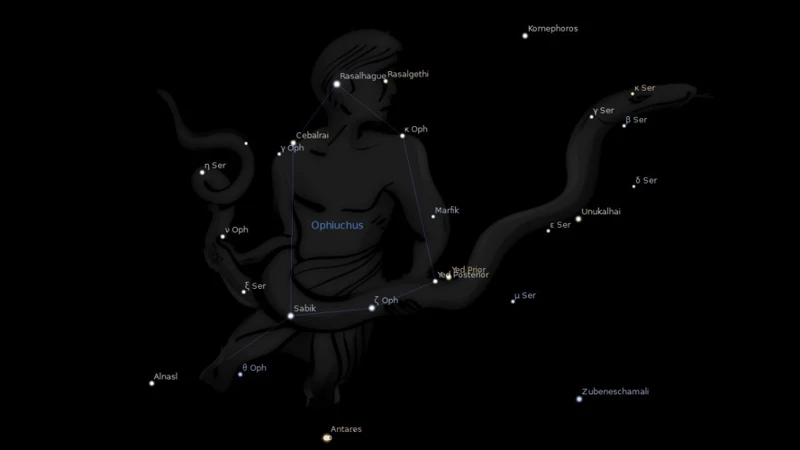
Ophiuchus has gained attention in contemporary astrology due to its association with the 13th zodiac sign controversy. While not recognized in traditional Western astrology, Ophiuchus enthusiasts believe that it should be included as a valid zodiac sign. Some astrologers interpret Ophiuchus as representing individuals born between November 29 and December 17, rather than being a separate zodiac sign. Those born under Ophiuchus are said to possess unique personality traits attributed to the constellation’s mythological origins. They are often described as intuitive, intelligent, and charismatic individuals, with a natural inclination towards healing and wisdom. Ophiuchus is believed to influence a wide range of aspects in an individual’s life, including relationships, career choices, and personal growth. While controversial, the exploration of Ophiuchus in contemporary astrology provides an interesting perspective on the diverse characteristics and influences that shape our lives and personalities. To learn more about the astrological traits associated with Ophiuchus, you can check out our article on exploring astrological traits of famous Ophiuchus personalities.
4.1 The 13th Zodiac Sign Controversy
The inclusion of Ophiuchus as a potential 13th zodiac sign has sparked a heated controversy among astrologers and enthusiasts. This debate stems from the idea that the zodiac signs are based on the twelve equal divisions of the ecliptic, which is the path of the Sun across the celestial sphere. The introduction of Ophiuchus as a zodiac sign would disrupt the traditional understanding of the zodiac system and require the realignment of dates associated with each sign. Proponents argue that Ophiuchus deserves recognition due to its position in the sky and its rich mythological background. They claim that Ophiuchus represents individuals born between November 29th and December 17th, introducing unique personality traits and characteristics. However, skeptics argue that the addition of a 13th sign would undermine the existing astrological framework and create confusion among followers of astrology. As the controversy rages on, it’s important to approach the topic with an open mind and consider the perspectives of both sides. Regardless of the debate’s outcome, exploring the enigmatic personality of Ophiuchus and its potential impact on astrology is a fascinating endeavor.
4.2 Ophiuchus Personality Traits
Ophiuchus individuals are believed to possess distinct personality traits that make them stand out from the rest. Known for their mysterious aura, Ophiuchus personalities tend to be highly intuitive, perceptive, and wise. They have a natural inclination towards spirituality and the search for deeper meaning in life. These individuals are often seen as healers, both physically and emotionally, with an innate ability to understand and empathize with others. Ophiuchus individuals are also known for their determined and ambitious nature, striving for success in their endeavors. They have a strong sense of justice and fairness, which fuels their drive to make a positive impact in the world. Ophiuchus individuals are natural leaders who possess great charisma and charm, attracting others with their magnetic presence. While they may face challenges and obstacles along their path, their resilience and determination enable them to overcome adversity and achieve greatness. Explore further the fascinating individuals born under the sign of Ophiuchus and their remarkable career paths and success stories.
Conclusion

In conclusion, exploring the mythological origins of Ophiuchus has offered us a glimpse into the rich tapestry of legends and cultural connections surrounding this fascinating constellation. From Greek mythology, where Asclepius, the healer, transformed into a constellation, to the influence it had on ancient Egyptian, Babylonian, and Hebrew cultures, Ophiuchus has left an indelible mark on human history. While its inclusion in the zodiac remains a subject of debate, contemporary astrology has sparked interest in Ophiuchus, with discussions on personality traits and its potential impact on individuals’ lives. Whether you are an astrology enthusiast or simply in awe of the wonders of the night sky, delving into the mythological origins of Ophiuchus will undoubtedly deepen your appreciation for the celestial wonders that surround us. As we continue to unravel the mysteries of the universe, Ophiuchus and its stories will always have a place among the stars.
Frequently Asked Questions
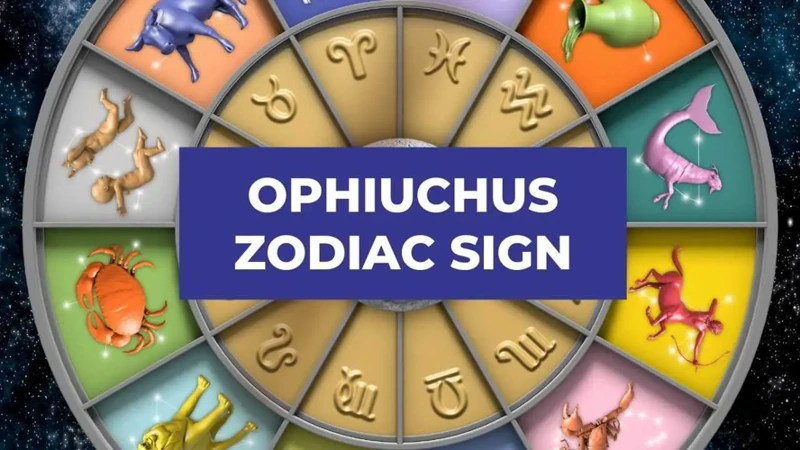
1. What does the name “Ophiuchus” mean?
The name “Ophiuchus” is derived from the Greek words “ophis,” meaning serpent, and “ous” or “ouchos,” meaning holding or bearing. It refers to the constellation’s representation of a man holding a serpent.
2. Why is Ophiuchus not included in the traditional zodiac?
Ophiuchus is not included in the traditional zodiac because the zodiac is divided into 12 equal parts, each corresponding to a specific constellation. However, there are actually 13 constellations that cross the ecliptic, including Ophiuchus.
3. Which stars are the brightest in the constellation of Ophiuchus?
In the constellation of Ophiuchus, the brightest stars are Rasalhague, a binary star system, and Sabik, which means “foreleg” in Arabic. These stars shine brightly in the night sky and contribute to the constellation’s splendor.
4. How can I locate Ophiuchus in the night sky?
To locate Ophiuchus, look towards the southern sky in the Northern Hemisphere during the summer months. It can be found between the constellations of Scorpius and Sagittarius.
5. What is the mythology behind the representation of Ophiuchus?
The mythology of Ophiuchus is rooted in Greek legends. It is often associated with Asclepius, the god of medicine and healing. The constellation represents Asclepius holding a serpent, which symbolizes both his wisdom and his ability to bring forth healing.
6. Are there any famous personalities associated with Ophiuchus?
While Ophiuchus is not traditionally included in astrology, there are some individuals said to be born under this constellation’s influence. These individuals are believed to possess unique traits and characteristics associated with Ophiuchus.
7. How does Ophiuchus impact astrology?
Ophiuchus has sparked debates and controversy in the astrological community. Some enthusiasts advocate for its inclusion as the 13th zodiac sign, while others argue against it. This debate brings attention to the fluid nature of astrology and its various interpretations.
8. Does Ophiuchus have any links to ancient Egyptian culture?
Yes, Ophiuchus has connections to ancient Egyptian culture. In Egyptian mythology, it is associated with the god Imhotep, who was known as a healer and a wise sage. Imhotep’s attributes align with the characteristics of Ophiuchus.
9. Are there any significant astronomical features within the constellation of Ophiuchus?
Ophiuchus showcases several noteworthy astronomical features. It contains the Barnard’s Star cluster, which is a group of stars that formed together. Additionally, it houses variable stars, which exhibit changes in brightness over time, adding to the constellation’s allure.
10. How does Ophiuchus influence one’s personality traits?
Although not widely recognized in mainstream astrology, Ophiuchus is associated with unique personality traits such as intuition, wisdom, and a deep connection to spirituality. Exploring the personality traits of Ophiuchus can provide a fresh perspective on astrological interpretations.
References
- Mythology of the constellation Ophiuchus
- What Is Ophiuchus And Is It Really Part Of The Zodiac?
- Ophiuchus
Frequently Asked Questions

Q1: What is the constellation of Ophiuchus?
The constellation of Ophiuchus is a grouping of stars located in the southern celestial hemisphere. It is often depicted as a man holding a snake, and it is one of the 88 recognized constellations in the night sky.
Q2: How was the constellation of Ophiuchus discovered?
The constellation of Ophiuchus has been recognized since ancient times. It was first cataloged by the Greek astronomer Ptolemy in the 2nd century AD, but its existence and significance date back even further.
Q3: What is the representation of Ophiuchus in the zodiac?
In the zodiac, Ophiuchus is often referred to as the 13th sign. However, it is important to note that the traditional zodiac consists of 12 signs. Ophiuchus is not officially recognized as a zodiac sign in mainstream astrology.
Q4: Who is Asclepius, the god of medicine?
In Greek mythology, Asclepius is the god of medicine and healing. He was known for his exceptional skills in curing illnesses and was seen as a savior by many. Asclepius played a significant role in the mythological origins of Ophiuchus.
Q5: What is the significance of the serpent and the staff in Ophiuchus mythology?
In the mythology of Ophiuchus, the serpent and the staff play a crucial role. The serpent represents healing and wisdom, while the staff symbolizes the power and authority of Asclepius as the god of medicine.
Q6: What was the wrath of Zeus towards Asclepius?
According to mythology, Asclepius became so skilled in healing that he could bring people back from the dead. This act of defying the natural order angered Zeus, who then struck Asclepius with a thunderbolt, resulting in his death.
Q7: How did Asclepius transform into the constellation of Ophiuchus?
After Asclepius’s death, he was placed among the stars as a constellation by Apollo. Apollo wanted to honor Asclepius’s contributions to medicine and immortalize him for eternity. Thus, Asclepius became the constellation of Ophiuchus.
Q8: What is the connection between Ophiuchus and Egyptian mythology?
In Egyptian mythology, Ophiuchus is associated with the god Imhotep, who was believed to possess great healing abilities. Imhotep was later identified with Asclepius, further linking the Egyptian and Greek mythological traditions.
Q9: How does Ophiuchus fit into Babylonian astrology?
In Babylonian astrology, Ophiuchus is closely linked to the figure of Gilgamesh, a legendary hero. The constellation represents the struggle between Gilgamesh and the serpent-like demon called Humbaba.
Q10: What are the personality traits associated with Ophiuchus in contemporary astrology?
In contemporary astrology, those associated with Ophiuchus are often described as passionate, intuitive, and driven. They possess a natural curiosity and have a deep desire to explore the mysteries of life and uncover hidden truths.
